
Genial Pieter Claesz Vanitas Stillleben 1625
Pieter Claesz was an eminent Dutch still-painter of the 17th century. His range of subjects included simple breakfast settings with glinting glass or metal objects painted in a largely monochromatic palette. Claesz also made several vanitas paintings during his career—allegorical still lifes which included symbols of death or impermanence to.
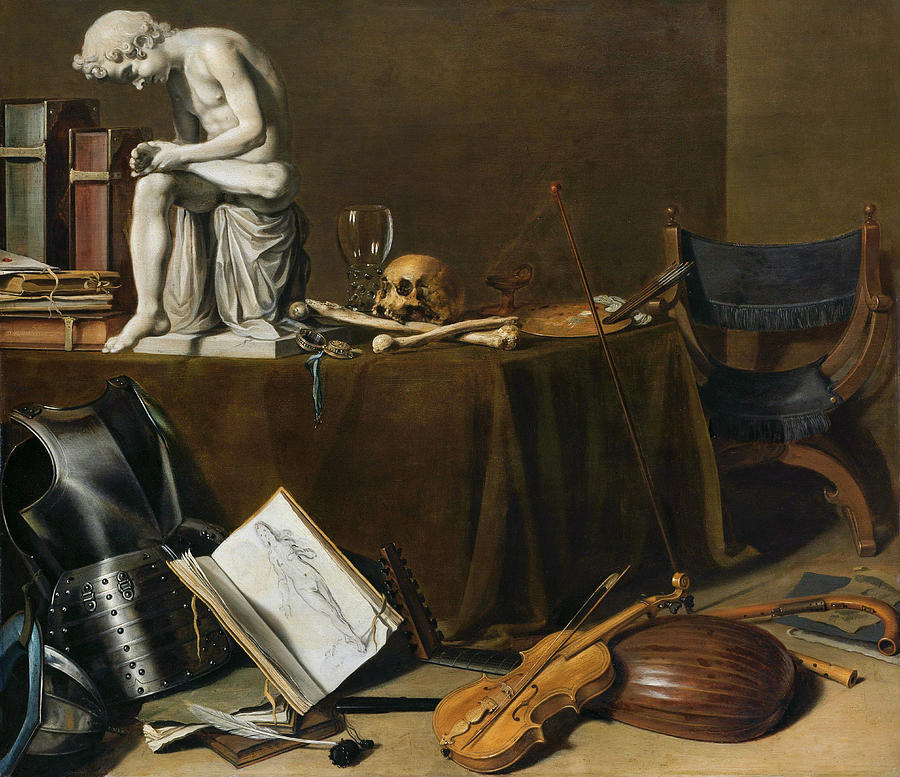
Vanitas Still Life with the Spinario Painting by Pieter Claesz
Vanitas Still Life with the Spinario, Pieter Claesz, 1628 Show details 1,292 Vanitas Still Life with the Spinario, Pieter Claesz, 1628 oil on panel, h 70.5cm × w 80.5cm Catalogue entry Appearances can be deceptive - certainly in painting, which gives only an impression of reality.
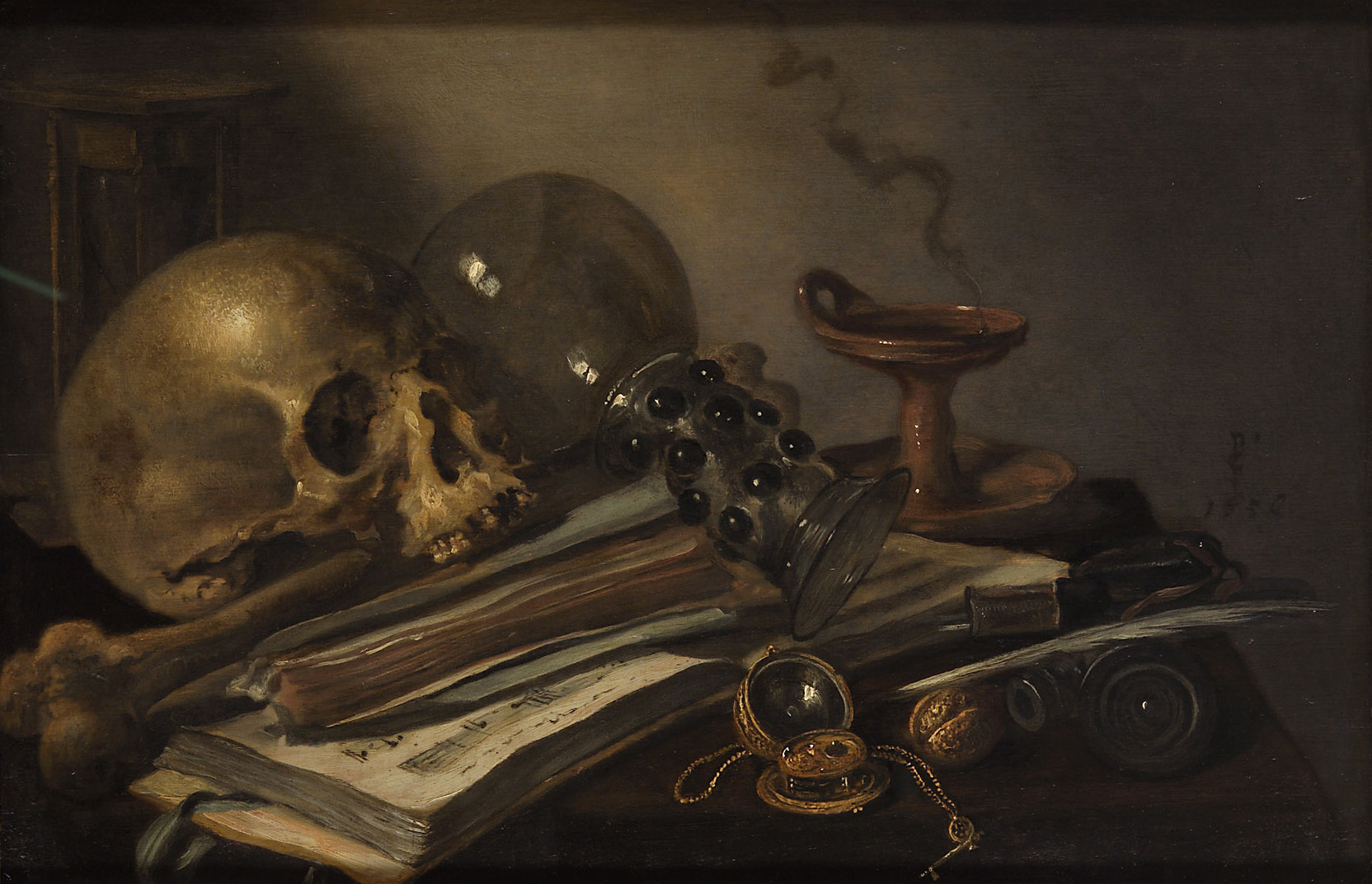
Kunsthistorisches Museum VanitasStillleben
Vanitas Still Life Vanitas Still Life By Pieter Claesz. Request. High resolution Please fill in the required fields as completely as possible: Number. First name *. Pieter Claesz. A table with a candle, burning, a watch, an anemone,a skull and a letter with the words Haarlem and Georg. The objects were carefully chosen for what they stood.

Musical Vanitas after Pieter Claesz Vanitas, Vanitas paintings, Dutch still life
Vanitas with the Spinario is a 1628 still life painting by Pieter Claesz, now in the Rijksmuseum in Amsterdam. It belongs to the sub-genre of vanitas.To the left is a reduced-size reproduction of the Spinario statue.. Sources (in Spanish) Rynck, Patrick de: Pieter Claesz, «Naturaleza muerta vanitas con el "Spinario"», en las pp. 266-267 de Cómo leer la pintura, 2005, Grupo Editorial Random.

Sapori in concerto La Vanitas nella pittura dell'olandese Pieter Claesz
Vanitas Still-Life. 1630. Oil on canvas, 39,5 x 56 cm. Mauritshuis, The Hague. Nearly all Dutch still-lifes include - to a greater or lesser extent - the aspect of vanitas, a lament about the transience of all things. It is often symbolized by objects such as a skull or a clock, as in this painting, where the effect is enhanced by an overturned.
File1628 Claesz VanitasStillleben mit Selbstbildnis anagoria.JPG Wikimedia Commons
Pieter Claesz Master of Haarlem Still Life. Vanitas Still Life with Overturned Gilded Cup and Chain, c.1630, oil on panel, 53 x 78 cm (20 7/8 x 30 11/16 in.),. Overview: 30 still-life paintings by 17th-century Dutch artist Pieter Claesz were included in this first international exhibition of his work, along with 6 still lifes by his.

Vanitas. Still Life Pieter Claesz encyclopedia of visual arts
Pieter Claesz (c. 1597 - 1 January 1660) was a Dutch Golden Age painter of still lifes . Biography Vanitas with the Spinario, 1628, Rijksmuseum, Amsterdam. He was born in Berchem, Belgium, near Antwerp, where he became a member of the Guild of St. Luke in 1620.
Pieter Claesz Vanitas Still Life (1630) r/museum
Das Vanitas-Stillleben (lateinisch vanitas „Eitelkeit", „Nichtigkeit") ist ein Bildtypus der Stillleben-Malerei,. Pieter Claesz Stillleben mit Totenkopf, Folianten, Taschenuhr und erloschener Öllampe, 1630, Öl auf Holz, 39,5 × 56 cm, Mauritshuis, Den Haag.

Frisch Pieter Claesz Vanitas Stillleben Mit Nautiluspokal
Renowned for producing vanitas still lifes at a rapid pace, the imagery in Pieter Claesz's Vanitas Still Life (1630) is saturated with symbolic potency: the golden pocket watch, the empty overturned glass, the skull and the unlit oil lamp allude to death, warning the viewer of the futility and meaninglessness of material goods and possessions.

Desde el Renacimiento hasta nuestros días Pieter Claesz (15971661) Vanitas, Dutch Still Life
Pieter Claesz. Pieter Claesz (c. 1597-1 January 1660) was a Dutch Golden Age painter of still lifes . He was born in Berchem, Belgium, near Antwerp, where he became a member of the Guild of St. Luke in 1620. He moved to Haarlem in 1620, where his son, the landscape painter Nicolaes Pieterszoon Berchem was born (October 1).
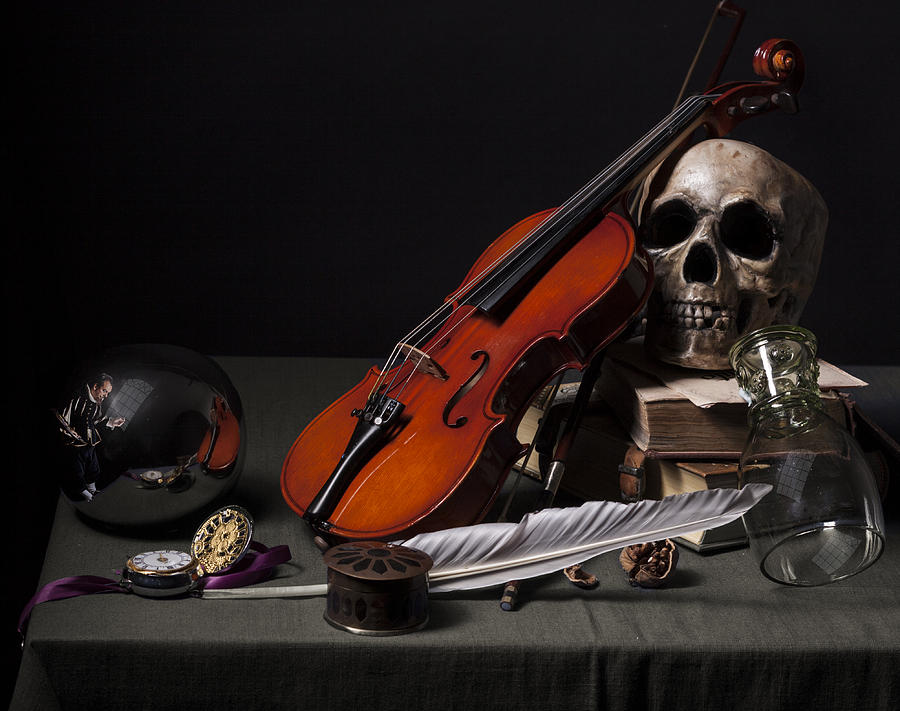
Pieter Claesz Vanitas Still Life With Violin And Glass Ball 1628 Photograph by Levin Rodriguez
'Vanitas Still Life with Self-Portrait', Pieter Claesz, 'Vanitas', Edward Collier. Vanitas still life's, which are associated with artists in Northern Europe in the 16th and 17th century, depict objects with symbolic importance, which convey a narrative through their symbolism. These works are meant to highlight the fragility and.

N. L. Peschier (Holanda, activo c. 1661). Vanitas still life, 1660. Rijksmuseum. Memento Mori
Entry. In addition to breakfast and banquet pieces, quite a few vanitas still lifes have survived from Pieter Claesz's early period. 1 Most of them are simple compositions with a skull and bones, large yellowed books, an empty or overturned glass, a watch, a small oil lamp that has just been snuffed out, a quill pen, and occasionally musical instruments, often a violin.

Pieter Claesz (1597/15981660) Still Life 'Vanitas' still life. 1643 Oil on panel Minneapolis
1628 On view at The Met Fifth Avenue in Gallery 520 In this still life, close observation and realistic detail operate in tension with explicit symbolism. The toppled glass, gap-toothed skull, and guttering wick of an oil lamp all serve as stark symbols of life's brevity.

Pieter Claesz Vanitas Stillleben, c 1630 Öl auf Holz Auss… Flickr
Pieter Claesz Vanitas Still Life. 1630 Not on view. A snuffed-out candle, an empty glass, a watch and a skull. This is no random collection of objects. Each one conveys a message of mortality. Memento mori - remember you must die. The Haarlem artist Pieter Claesz became well-known for his still-lifes featuring a limited palette..
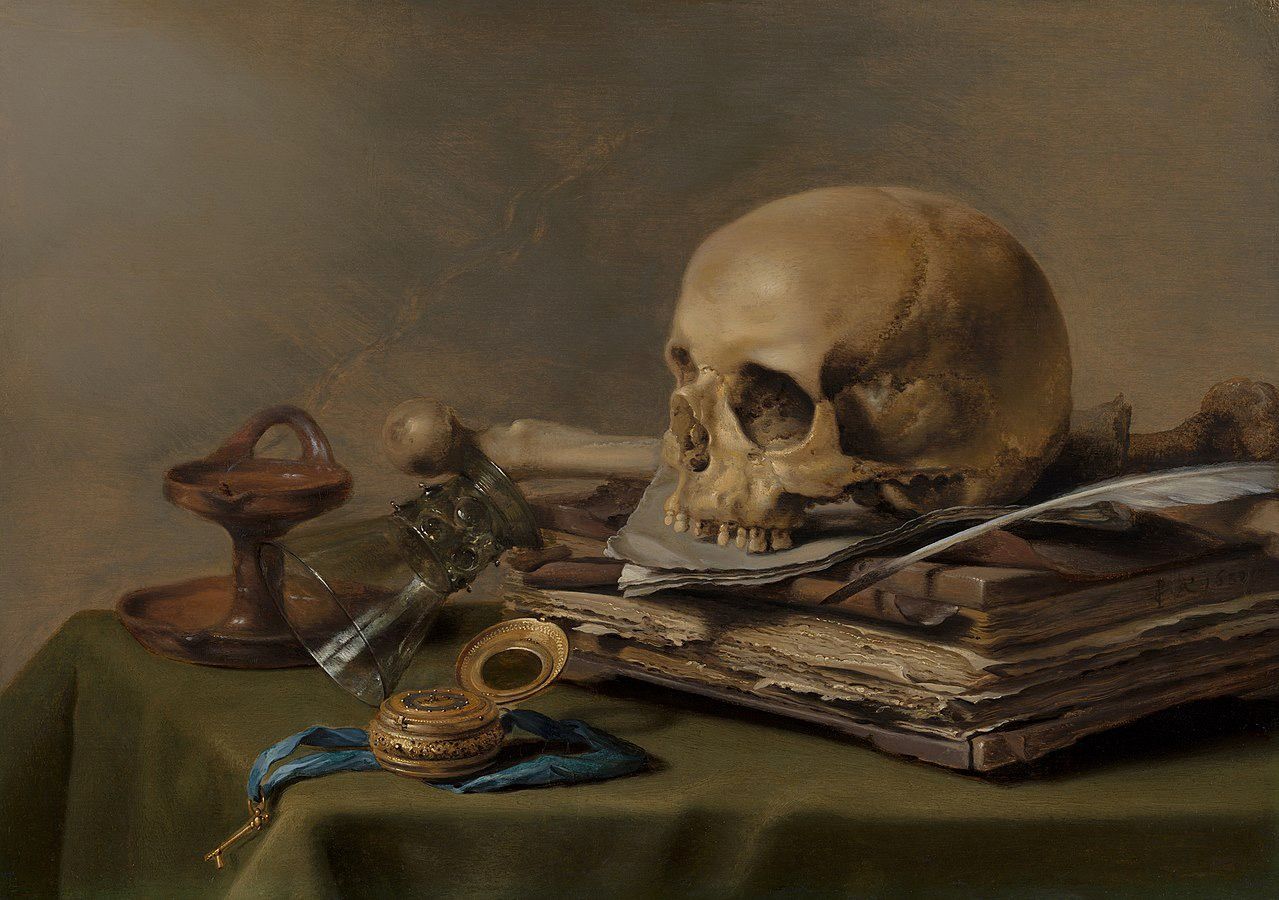
Pieter Claesz, Vanité tableau de et peinture de Claesz
Pieter ClaeszVanitas Still Life. 1630 Nicht zu sehen. A snuffed-out candle, an empty glass, a watch and a skull. This is no random collection of objects. Each one conveys a message of mortality. Memento mori - remember you must die. The Haarlem artist Pieter Claesz became well-known for his still-lifes featuring a limited palette.
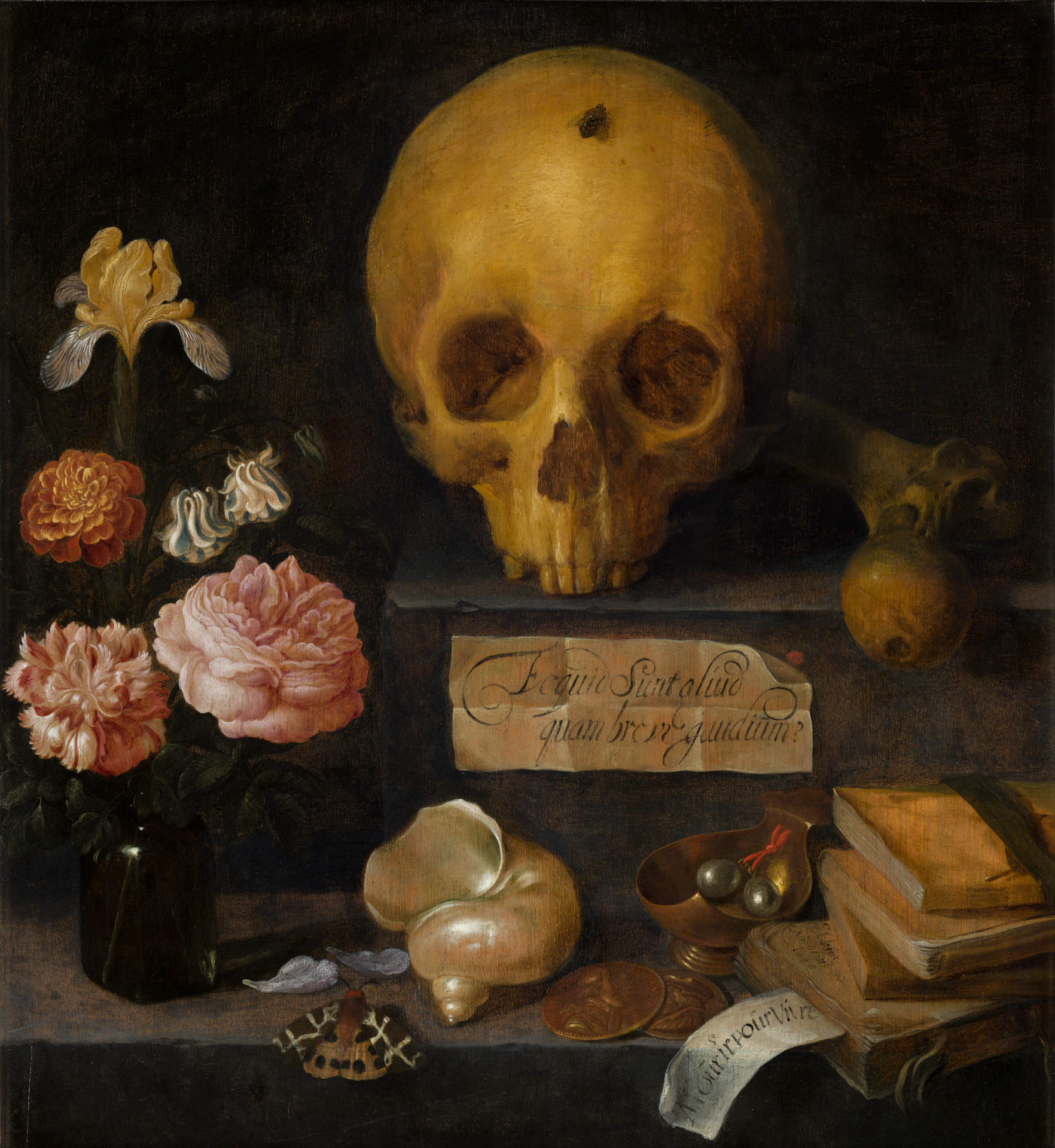
Vanitas Still Life Frans Hals Museum
The official position taken by the Wikimedia Foundation is that " faithful reproductions of two-dimensional public domain works of art are public domainThis photographic reproduction is therefore also considered to be in the public domain in the United States.